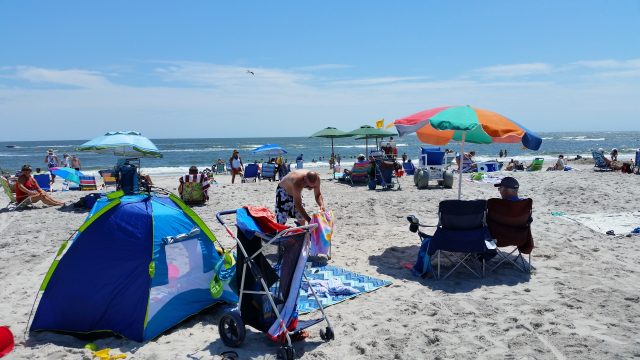By Donald Wittkowski
Think of them as friendly reminders to be on your best behavior on the beach.
Sea Isle City plans to print up informational cards outlining proper beach etiquette following complaints about smoking, drinking, rowdiness and a phenomenon known as “tent-spreading.”
The brochure-sized rack cards are part of a public education campaign that will be a kinder, gentler alternative than new laws to crack down on boorish beach behavior. In recent weeks, City Council has discussed the possibility of passing new ordinances for stricter beach regulations, but has not yet taken that step.
In the meantime, the city will distribute thousands of informational cards for the 2018 summer vacation season to remind beachgoers of the importance of being “courteous to the people next to you on the sand,” Sea Isle public relations director Katherine Custer said.
Custer is working on the cards with City Council President Mary Tighe, who came up with the idea for the public education campaign. They have not yet decided on the wording for the cards, but Custer stressed that it will not be some heavy-handed attempt to dictate proper beach behavior.
“The goal is to make a rather friendly rack card that reminds people of the do’s and don’ts of beach etiquette and to enhance everyone’s experience on the beach,” she said.
Custer wasn’t sure exactly how many cards will be printed, but estimated it will be in the thousands. Among other places, the cards will be available at the city’s Welcome Center on John F. Kennedy Boulevard.
They will also be included in the welcome bags given to summer tourists when they check in at local real estate offices to pick up the keys for their vacation properties.
Prompted by growing complaints about smoking, drinking and rowdiness on the beach, City Council held a hearing on Nov. 14 for suggestions from the public on how to clamp down on the problem.

Much of the public hearing focused on a relatively new phenomenon called “tent-spreading.” Some beachgoers have been monopolizing prime spots near the water by spreading out large tents, canopies or cabanas on the sand.
Council members and local residents discussed ways to prevent tents and canopies from dominating the beachfront and blocking the views of the ocean, including the possibility of imposing an outright ban.
Tighe and other Council members said they were not in favor of a ban. Tighe, though, did raise the possibility of having tighter regulations on tents and cabanas. Some members of the public urged Council to restricts tents and cabanas to the back of the beach, near the dunes, so they won’t block the view of the ocean.
Tents and canopies are popular among parents to protect their children from sunburn and skin cancer. Earlier this year, Councilman Frank Edwardi said tents are also a way to prevent aggressive seagulls from swooping down and snatching food.
Smoking on the beach, drinking, rowdy behavior and deep holes dug in the sand also have been drawing strong objections from the public.
Children and their parents often dig large holes to make sand sculptures, but forget to fill them in when they leave, creating a hazard for other beachgoers.
Instead of banning or restricting children from digging in the sand, Tighe suggested that perhaps the best approach would be an educational campaign to warn of the dangers of holes in the beach.
Also during the public hearing, some residents called on Council to ban smoking on the beach. They said they can’t tolerate the smell of cigars or cigarettes and will leave the beach if they are stuck next to a smoker.
Drinking alcoholic beverages is already prohibited on the beach, but city officials conceded that the law is often ignored.
“The blatantness is what people are really worried about,” Tighe said during the hearing. “It’s gotten worse over the years.”
Sea Isle police plan to step up their efforts to curtail drinking by having a more aggressive enforcement program next summer.
Police officers already pose as regular beachgoers to try to catch people drinking. Police Chief Thomas D’Intino has requested city funding to buy more ATVs for an even bigger police presence on the beaches.
Custer said the larger police presence, combined with the new informational cards and public education campaign, will be the centerpiece of the city’s effort to prevent rowdy beach behavior.
“We get a lot of new people who come to Sea Isle each year and not everybody is aware of our regulations,” she said.

Despite previous discussions by Council about the possibility of adopting stricter new beach ordinances, Custer said she has not heard of any definite plans to add new laws to the books.
Instead, city officials will heavily rely on the informational cards to get the word out, she noted.
“They have chosen this path,” Custer said.








